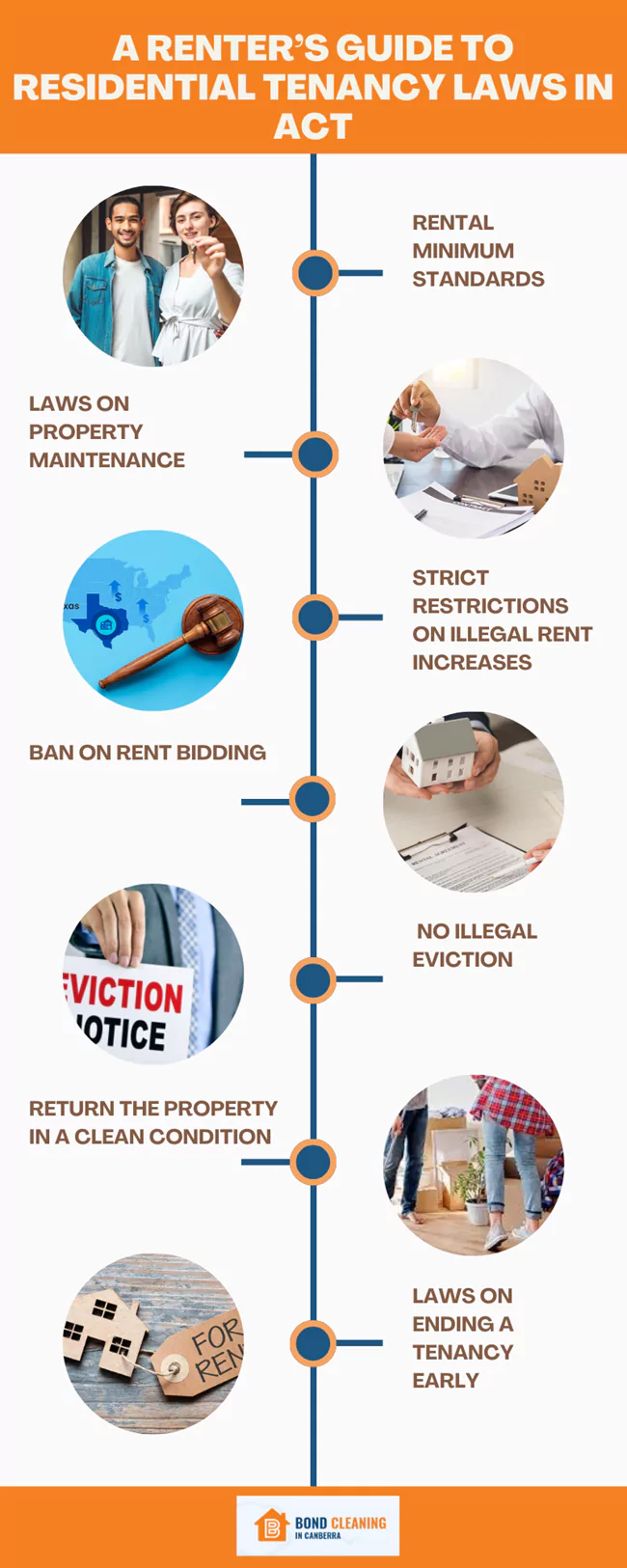A Renter’s Guide To Residential Tenancy Laws In Act
Many Australian renters are treated badly or evicted unfairly without giving a valid reason. They face a myriad of challenges throughout their tenancy period. These include illegal rent increases, overlooking property repairs, unreasonable access to the property, refraining from returning the full bond at the end of tenancy, and much more.
That’s one of the reasons why the ACT government sets out the Residential Tenancy Laws on occupancies. These laws are governed by the Residential Tenancies Act 1997 (ACT) to provide both parties with a fair and balanced framework. The main objective is to protect the tenants from illegal practices by landlords and property managers. This will help them know everything about their rights and responsibilities as a tenant.
It also provides a hassle-free and informal resolution to rental disputes via the ACT Civil and Administration Tribunal. If you want to avoid any conflict, hire professionals for a cheap end of lease cleaning Canberra at the end of your tenancy. This is because tenants are obliged to return the reasonably clean condition.
To learn more about your rights, read this guide and understand the residential tenancy laws in the ACT. Furthermore, you will find out about recent changes in the laws implemented by the RTA from 1 April 2023. Make sure you carefully understand them before signing your tenancy agreement.
Let’s Get Started!
Hide
Show
]1. Rental Minimum Standards
Renters are entitled to benefit from this residential tenancy law. According to the latest report, many tenants are living in low-quality housing that is expensive to cool or heat.
Before signing the agreement or paying your bond money, thoroughly inspect the premises and ensure they meet the minimum standards. All rooms should be free from mould, electrical faults, ceiling damage, and other potential hazards.
Landlords must provide the property in habitable or living condition at the beginning of a tenancy.
According to the latest reform, there is a new minimum energy efficiency standard for ceiling insulation. Property owners or landlords have a nine-month grace period to make their property energy efficient. They are required to indicate whether the property meets the latest minimum standard in all advertisements and lease agreements.
2. Laws on Property Maintenance
The landlords or property owners are completely responsible for maintaining the property. This also covers urgent repairs to any damage or fault that could lead to a potential injury.
As a tenant, you must notify your landlord about the requirement for urgent repairs, such as fault in smoke repairs, mould infestation, standard maintenance of lawn, etc.
However, if anything is damaged during a tenancy, the tenant must make necessary repairs. It is important to fix common household problems throughout your lease.
Tip: Get written permission from your landlord and fix the issue before the final rental inspection.
3. Strict Restrictions on Illegal Rent Increases

Illegal rent increases are one of the major concerns of many renters in Australia. However, this new law will restrict landlords from increasing rent on short periods. According to the residential tenancy laws, they can increase the rent every 12 months only on a fixed-term tenancy period or rolling lease. However, they must provide at least eight weeks’ notice.
Tip: Rent can’t be increased more than 10 per cent total or 5 per cent plus the percentage change in the cost of living. These norms are tied to the Consumer Price Index, and tenants can apply to the tribunal in case of an illegal rent increase.
4. Ban on Rent Bidding
Landlords or property managers must promote or advertise a property with a fixed rental price. This means they are not allowed to bid more than what is mentioned in the advertisement. However, renters can voluntarily offer higher amounts (if they want to). In such a scenario, landlords will be free to accept higher rental offers.
5. No Illegal Eviction
Many landlords evicted renters without giving any fair reason. So, the Residential Tenancies Act in ACT made significant changes and introduced this new law. Now, landlords can only vacate or evict the tenants if they give a valid reason listed in the RTA.
The eviction will be based on specific reasons, such as:
- Outstanding rent and bills
- Breaching the agreement
- Damage to the Property
- Dirty premises
- Illegal activities.
This will give more security to tenants who previously had bad experiences due to unfair evictions. However, if you are moving out of a rental property, take advantages of hiring professionals for an expert end of lease cleaning Canberra and save your hard-earned bond money. This will help you avoid unwanted rental disputes and also impress your landlord.
6. Support to Grow Food and Fruits
According to the recent changes, tenants can plant vegetables, fruits and flowers during their tenancy. However, they need to ensure that the plants are within two metres. They can also have a detachable compost bin on the premises. Make sure you add this clause to your tenancy agreement. The best part is landlords can’t refuse it.
7. Return the Property in a Clean Condition
This is one of the important laws in your tenancy. Most tenants lose their bond money due to half-baked cleaning at the end of a tenancy. According to the Tenancy Act, you should return the property in a clean and organised condition- as you received it at the beginning of your tenancy.
It is good to hire professionals for a quality end of lease cleaning Canberra and save your bond money. They follow a proper checklist and clean hard-to-reach spots to help transform a dirty property into a sparkling estate without disagreement.
8. Laws on Ending a Tenancy Early
If you are vacating a property at the end of your fixed-term lease, make sure you give at least three weeks’ notice. However, if you are ending it early, be ready to pay a fee. You must pay up to six weeks’ rent or as mentioned in the tenancy agreement.
Understand the residential tenancy laws in the ACT:

Wrapping Up
These are some of ACT’s most important and reformed residential tenancy laws that will help establish a transparent landlord-tenancy relationship. These laws will protect tenants from uncertain or illegal practices while helping landlords earn rental income without any hassle or disagreement.

